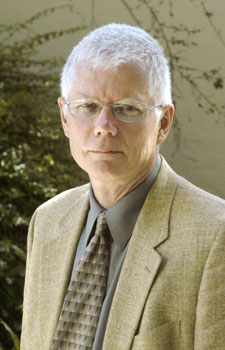1) OAA must live within its budget.
2) It must adhere to a strategic plan that directly links budget resources to academic programs on a structured, sustainable basis.
3) Cooperation among the major divisions—OAA, Student Affairs, Administrative Affairs, Advancement, Office of the President—is essential. He will give primacy to consensus and collegiality.

At the moment, Snyder is consulting with key players and constituencies, including most recently the Academic Senate, to build consensus, first of all, within Academic Affairs.
In a wide ranging interview, he spelled out what he has in mind for his trio of governing objectives, starting with the budget. He sought to dispel faculty confusion about whether a crisis exists. “The university posted a modest surplus last year, but Academic Affairs ran a deficit,” he said. “Faculty are asking, ‘Are we really going to be held to eliminate the deficit, or are we going to get some reprieve?’ The message I want to convey is that we are not going to look outside of Academic Affairs to solve our current budget problems. We will solve them internally. And we have to do so in a way that allows us to provide quality programs.”
Snyder will press for narrow, targeted cuts. “There is no question about that,” he asserted. In his judgment, across-the-board reductions are counterproductive because they weaken all programs alike: they are undiscriminating and therefore self-defeating.
His objective is to restructure the OAA’s budget so that about one-third of academic programs grow, the middle third stays the same and the last third shrinks or is phased out. “My goal is to carry out the cuts in ways that are sustainable, so that we can focus new money on growth and infrastructure” he said, adding, “We cannot afford to do all the things we have done in the past. That means we have to make some difficult choices. In the context of strategic planning, if we are looking at additional funds from enrollment growth, then we should have a plan about how to spend that money.”
Accordingly, he is going to develop a strategic plan that is OAA-wide. “In the past, OAA planning has not been coordinated. Every unit has had a plan, and things just sort of percolated up. The result has been a kind of broadly distributed laissez-faire competition that has not always functioned in the best interests of the University. I want something much more structured.”
He believes structural cuts are crucial because otherwise they are not sustainable. “You don’t add students to all your classes, you pick some classes that you enlarge, you leave others the same and you consider other, inefficient programs for elimination and put the freed-up resources elsewhere.”
Snyder defines strategic planning as “deciding how we want to grow and how we want to shrink, concurrently.” Reviews of academic programs and allocation of available resources must go hand-in-hand. This is not his mandate, Snyder underscores, it is a WASC requirement dating to 1990 that Humboldt State has failed to meet. He cited a key paragraph in the WASC Team’s report of that year: “HSU should develop an effective, campus-wide planning process that begins with a clear sense of what the campus should be like in the next decade . . . Campus planning should be linked to resource allocations and to the outcomes of program review and curricular assessments.”
Snyder noted the WASC’s insistence on campus-wide linkage of academic programs and budget allocations. He would like to see that happen, but for now he will be content if he can institute an OAA-wide plan. “We haven’t done it, we’re still not doing it, but we will do it,” he said.
He intends to set a new, cooperative example at Academic Affairs. Even if he believes the OAA deserves more resources, he will be non-partisan. “We’re going to do fewer things, but we are going to do them well, and that’s the only way we can do things. Strategic planning will assure us we’re spending our money reasonably. And we’re not going to engage in brawls anymore over the budget—it’s a bad business.”
Snyder said his strength as a leader is his ability to sense where other people stand and see things from their perspectives. “I’m not very partisan, I always try to take a larger view, I’m holistic,” he said. “That’s probably the main thing folks need to know about me, and I’m going to ask all of us to cooperate and work toward a shared vision of what the University should be like.”